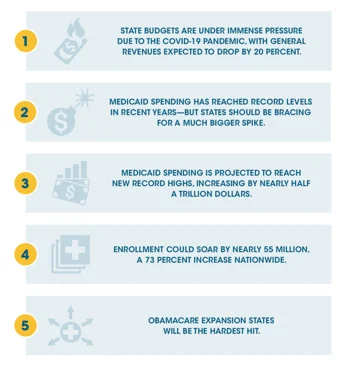 Filed Under: Health Economics
Filed Under: Health EconomicsMitigating Medicaid Costs During Surging Enrollment: COVID-19 Impact

Despite the gradual reopening of the economy, over 21 million Americans are still unemployed due to the COVID-19 pandemic. Even as states reopen, millions of people who have lost their employer-sponsored health coverage are turning to Medicaid.
A new study from the Foundation for Government Accountability sees Medicaid enrollment increasing by 55 million – a 73 percent increase nationwide. According to the report, state revenues could drop by 20 percent – at a time when Medicaid spending hits records highs. ACA expansion states will be hit the hardest.1

In one example, nearly 30,000 adults enrolled in Virginia’s expanded Medicaid program during its emergency COVID-19 enrollment window. 2 ACA plans are also surging. Covered California reported 2.5 times more enrollments during its COVID-19 window compared to 2019.3
What’s more, States are facing significant budget shortfalls from business closures, reduced tax revenue, delays in tax receipts, and a looming economic recession.
During a pandemic, state Medicaid directors understandably feel that their hands are tied – that they can’t raise revenues, cut enrollment, or solve the virus – but they can deploy tools to mitigate rising costs.
Specialty Solutions help manage rising Medicaid NICU costs
In a Medicaid population, 1 in 8 infants begins their life in the NICU or a special care nursery. Even though NICU claims are small by proportion, by impact, they represent a disproportionately – high percentile of costs.

This is an example of where a well-designed and credible specialty solution can help manage these rapidly rising costs. As I talk with peers who work in both health plans and other population health solutions, we agree. We agree that not only are these unprecedented times for our country and COVID-19, the explosion of Medicaid rosters in such a brief time in recent history is itself unprecedented.
My observations are closest to NICU Care Management. Without specialized NICU Care Management – Utilization Management and Case Management – these claims will continue to increase for both in-patient and post-discharge NICU patients. A growing body of research as well as anecdotal information show how Social Determinants of Health (SDOH) drive Medicaid costs. Integrating social care into the delivery of health care can reduce Medicaid costs and enhance a family’s health and well-being both in the near term and longer term.
ProgenyHealth provides the Case Management (CM) infrastructure needed to integrate NICU-specific SDoH case management into a Medicaid program.
When transportation, shelter, food, emotional and clinical health, and other needs are met, Medicaid programs can reduce readmissions and increase savings – while the mother and family experience enhanced health and well-being.
Coupled with NICU Utilization Management (UM), the integration of UM and CM can drive a reduction in ER visits, cut the average length of stay from 19.6 to 16.2 days, and capture further savings by scrutinizing diagnostic severity and level of care in coding.4
For the past seventeen years, ProgenyHealth has partnered with Medicaid Plans nationwide to improve health outcomes while lowering costs. During this era of surging enrollments and costs, more than ever, Medicaid programs are encouraged to optimize length-of-stay, reduce readmissions, monitor billing, and solve for Social Determinants of Health.
These are, indeed, unprecedented times – triggered by COVID-19 and now a confluence of events making it even more important to identify smart, accountable partners.
Ann Kent is the Chief Growth Officer at ProgenyHealth
BLG041
- thefga.org/news/medicaid-enrollment-to-swell-by-73-percent-nationwide-according-to-new-research/
- apnews.com/883fb64b8dd941896a410c247cbb572e
- www.coveredca.com/newsroom/news-releases/2020/05/20/covered-california-sees-more-than-123000-consumers-sign-up-for-coverage-during-the-covid-19-pandemic/
- www.progenyhealth.com/nicu-problems-we-solve/optimizing-nicu-savings-levers/





 Prev
Prev